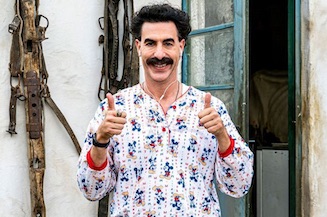|
|
Movie Review - Borat Subsequent Moviefilm: Delivery of Prodigious Bribe to American Regime for MakeBy Matthew HuntleyNovember 8, 2020
In another scene, Borat asks a baker to write out “Jews will not replace us” in frosting on a chocolate cake, echoing the chant by white supremacists in Charlottesville, VA in 2017. The baker, simply fulfilling her customer’s request, proceeds to do just that and doesn’t even think to refuse or protest. The movie is filled with many other apathetic reactions to arguably ludicrous and reprehensible behavior, and even though such tepid responses aren’t surprising, they’re still appalling. Have we all gotten this complacent, lazy and/or scared to express ourselves directly about things we inherently know to be immoral? Sure, we can Tweet, post and write movie reviews, but what happened to speaking our minds in person? The movie awakens us to the idea it’s wrong we’ve become so jaded and lethargic when it comes to the persecution of other people and that too often we simply let things slide. In fact, it jumpstarts us to act like human beings again, and we draw inspiration, for instance, from Jeanise Jones, a black babysitter in the film who isn’t afraid to voice her thoughts about women deserving self-respect and respect from others. On this level, “Moviefilm” has a veritable purpose. As a comedy and pure entertainment, however, it’s not as effective. This is a shame, too, because Borat the character, in spite of his ignorance and impropriety, is still so innocent and loveable, and so we wish he had found himself in a more inspired screenplay. Cohen and his fellow seven writers once again blend the mockumentary gags with a goofy side plot that turns out to be a mostly dull and frivolous distraction. The “plot” picks up 14 years after the first film when Borat is serving a life sentence of hard labor in a gulag for humiliating his home country. Kazakhstan’s Premier (Dani Popescu) tells him he can go free if he successfully completes a mission to deliver Johnny the Monkey, the country’s Minister of Culture, to Donald Trump as a gift, in hopes that Trump will use his pull and celebrity to reclaim respect to the nation. Of course, zany people and circumstances ensue and inevitably disrupt Borat’s plans, not least Borat learning he has a “non-son,” which is to say he has a daughter. Her name is Tutar (Maria Bakalova), who’s 15 and has been brought up to believe her only purpose as a female is to keep quiet and please men. Nevertheless, she’s curious about the world and she stows away to America to join her father. Without giving too much away, Tutar takes the place of Johnny the Monkey and becomes the intended gift to Mike Pence and then to Rudy Giuliani. As Borat and Tutar embark on a cross-country tour to get her ready, they encounter a range of real-life people, places and events that serve as the punchlines for the movie’s jokes, including CPAC; an anti-abortion pastor; fathers and daughters at a debutante ball; an Instagram influencer; a plastic surgery clinic; QAnon conspiracy theorists; and one or two of the political figures I mentioned above. Because we’ve already been down this road with the first “Borat” and can essentially anticipate what will happen given its familiar structure, the setups and reactions from people don’t have the same punchy impact they once did. Most of the time we watch “Moviefilm” knowing what it’s going to do ahead of time and then simply watch it do it. All the while, in the back of our minds, we’re hoping it will catch us off guard and try something different. It never really does though, and I know the point of a movie like this isn’t to tell an original or involving story, but I still wish Woliner and Baron Cohen had found a way to make the plot and gags less predictable. There were times when they even seemed desperate to get a visceral reaction out of us. I’m not saying the site of someone stuffing their face with a cupcake and accidentally eating a plastic baby, or bloody genitals, or a half-naked man wearing a strap-on dildo can’t be funny when done right and unexpectedly, but here they’re mostly gross and, frankly, stupid. Because “Borat Subsequent Moviefilm” strives to be a comedy first, and its humor falls mostly flat, I can’t justifiably recommend it overall. However, its political and humanitarian messages are worth hearing. As silly and vulgar as the movie is on the outside, it sincerely encourages us to remember it’s never too late to seek, learn or speak the truth; to make an effort to really listen to someone else’s perspective; and to not pass judgment on anyone or anything before we have the requisite knowledge. I’m wise enough to know the movie isn’t likely to change anyone’s vote, at least not right away, but I’m hopeful it will resonate with people and remind us to speak kindly and, if need be, assertively to one another in person so that we can more effectively help one another out of any absurd time we may find ourselves in, maybe even bring the absurdity levels down a bit . I think we’d all be better off if we could once again consider the things Borat says and does to be shocking and outrageous instead of normal and then have the courage to call him out on it.
|

|
|
|

|
Thursday, October 31, 2024
© 2024 Box Office Prophets, a division of One Of Us, Inc.


